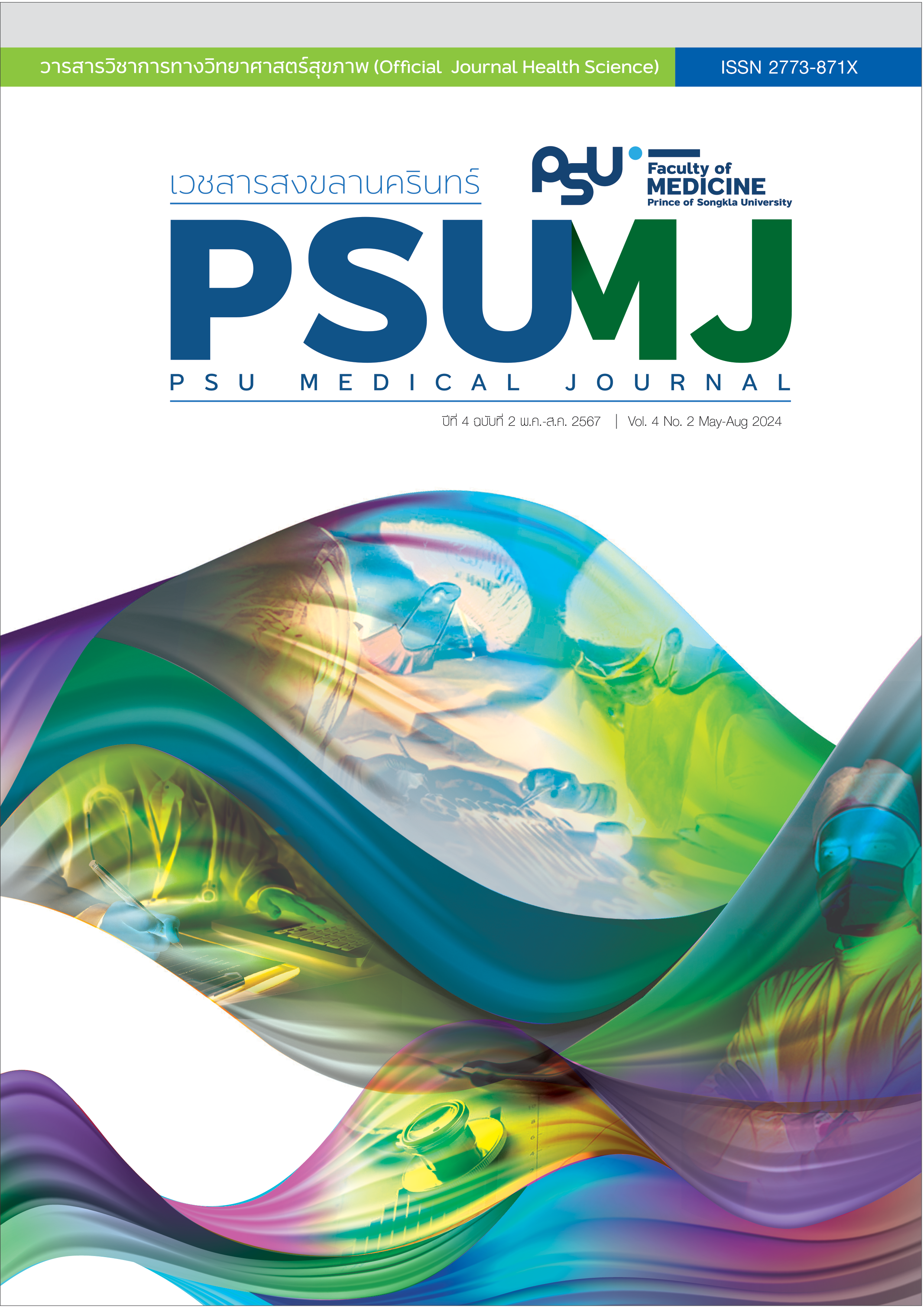Association Between Time to Colonoscopy After Abnormal Fecal Immunochemical Test and Risk of Adenoma, Advanced Colorectal Neoplasia and Colorectal Cancer Incidence
DOI:
https://doi.org/10.31584/psumj.2024268310Keywords:
colonoscopy, colorectal cancer, colorectal neoplasms, fecal immunochemical test, screening intervalAbstract
Objective: Colorectal cancer (CRC) is a significant health concern in Thailand, with high incidence and late-stage diagnosis rates. This study investigates the timing of colonoscopy following a positive fecal immunochemical test (FIT) and identifies risk factors for colorectal neoplasms.
Material and Methods: A retrospective analysis included Thai patients aged 50-75 with a positive FIT who underwent colonoscopy. Exclusions were made for prior colonoscopy, colorectal surgery history, hereditary syndromes, inflammatory bowel disease, and incomplete pathology reports. Data from January 2018 to December 2021 were assessed for demographics, colonoscopy findings, and pathology outcomes.
Results: The study encompassed 2,717 participants with balanced age and gender distributions. Preliminary risk factors associated with the development of adenoma and advanced colorectal neoplasia (ACRN) included age [odds ratio (OR): 1.03, 95% confidence interval (CI): 1.02-1.05, p-value<0.001], gender (OR for males: 1.60 for adenoma, 1.69 for ACRN, p-value<0.001), and smoking (OR: 1.92, p-value=0.001). The timing of colonoscopy within one-year post-FIT did not exhibit statistically significant associations with adenoma, ACRN, or CRC.
Conclusion: This study provides valuable insights into CRC screening in Thailand. It suggests that timing within a year of colonoscopy might not be the sole determinant of improved outcomes post-FIT. Preliminary risk factors encompassed age, gender, and smoking. Future studies should focus on larger cohorts to investigate adverse outcomes, such as late-stage CRC and CRC-related mortality.
References
Hospital-based cancer registry 2020 [homepage on the Internet]. Coventry: National Cancer Institute Department Of Medical Services Ministry of Public Health Thailand [cited 2022 July 1]. Available from: https://www.nci.go.th/e_book/hosbased_2563/index.html
CRC screening [homepage on the Internet]. Coventry: National Cancer Institute Department Of Medical Services Ministry of Public Health Thailand [cited 2022 July 1]. Available from: https://www.nci.go.th/th/screening01.html
Gellad ZF, Almirall D, Provenzale D, Fisher DA. Time from positive screening fecal occult blood test to colonoscopy and risk of neoplasia. Dig Dis Sci 2009;54:2497-502.
Corley DA, Jensen CD, Quinn VP, Doubeni CA, Zauber AG, Lee JK, et al. Association between time to colonoscopy after a positive fecal test result and risk of colorectal cancer and cancer stage at diagnosis. JAMA 2017;317:1631-41.
Kim NH, Lim JW, Kim S, Lim JY, Kim W, Park JH, et al. Association of time to colonoscopy after a positive fecal test result and fecal hemoglobin concentration with risk of advanced colorectal neoplasia. Dig Liver Dis 2019;51:589-94.
Mutneja HR, Bhurwal A, Arora S, Vohra I, Attar BM. A delay in colonoscopy after positive fecal tests leads to higher incidence of colorectal cancer: a systematic review and meta-analysis. J Gastroenterol Hepatol 2021;36:1479-86.
San Miguel Y, Demb J, Martinez ME, Gupta S, May FP. Time to colonoscopy after abnormal stool-based screening and risk for colorectal cancer incidence and mortality gastroenterology. 2021;160:1997-2005.e3.
Downloads
Published
How to Cite
Issue
Section
License
Copyright (c) 2024 Author and Journal

This work is licensed under a Creative Commons Attribution-NonCommercial-NoDerivatives 4.0 International License.








